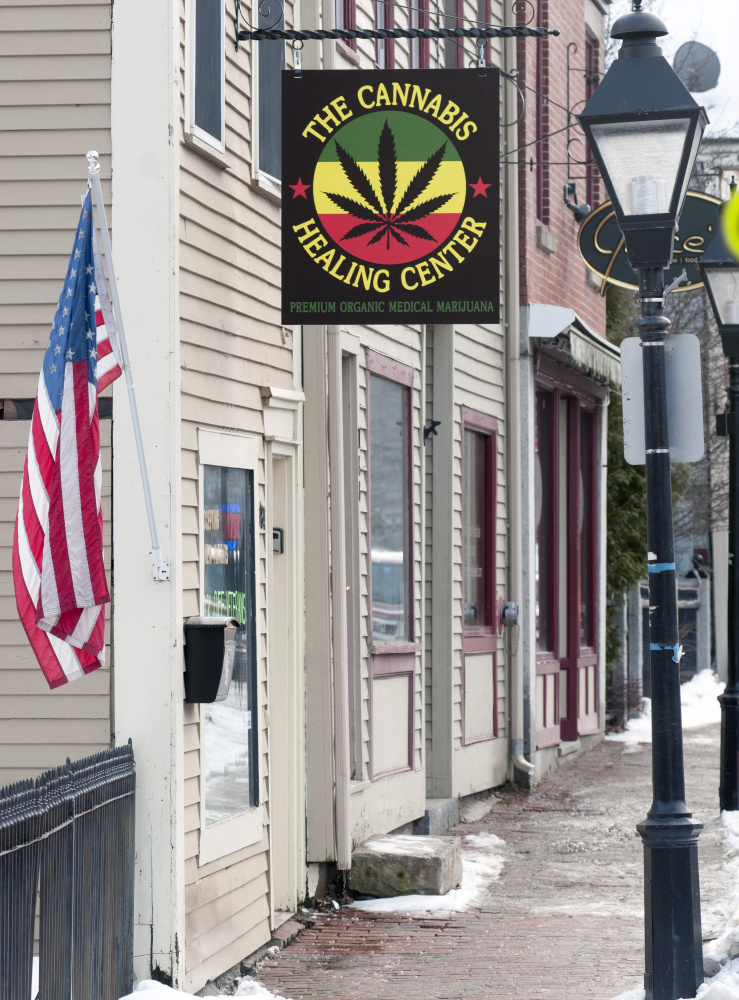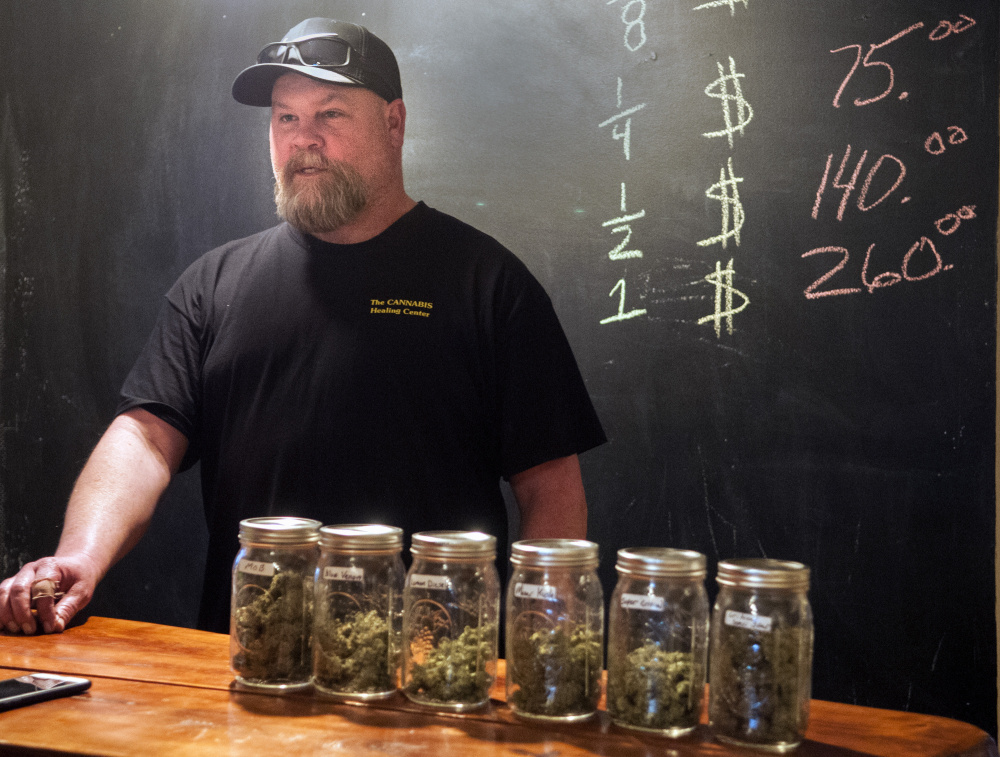HALLOWELL — Derek Wilson opened a medical marijuana retail shop on Water Street earlier this month and said he’s well positioned to expand his business once the rules and regulations for selling recreational marijuana are announced.
Wilson, who has been a licensed caregiver since 2012, pulled back a black curtain Jan. 5 at 184 Water St. and said having a retail location is important because of market saturation.
“I tried to go to Augusta, but I got shut down because they said I had to be in the city’s medical district near the hospital; but I wanted to be near where I grow (my plants),” Wilson said.
Hallowell Mayor Mark Walker appointed a marijuana task force, which met Tuesday, to look at how other states and cities handle recreational marijuana and to recommend whether Hallowell should enact a moratorium. Last month, the Augusta City Council approved a six-month moratorium on the establishment of any recreational marijuana stores and social clubs within city limits.
Hallowell Councilor Lynn Irish, who is on the committee, said she was surprised that everybody seems to be in favor of taking a wait-and-see approach.
“Everyone on the task force agrees that there is no sense in doing anything until we know what the state’s going to do,” Irish said at her Water Street quilt studio. “The Maine Municipal Association has been recommending a moratorium, but so far, nobody here has been in favor of it.”
Irish said she in unsure when the task force will meet again. Meanwhile, Hallowell officials will wait for guidance from the state and local agencies regarding potential licensing, background checks and permits for recreational marijuana-related business.
During the meeting, task force members talked about the potential effects marijuana social clubs or retail stores might have on local business, whether Hallowell would need additional police officers to enforce the new law and what the application process would look like.
Hilary Davis, who owns Scrummy Afters Candy Shoppe, said she doesn’t know enough about the marijuana industry to judge what it might mean to Hallowell, and she isn’t sure other business owners do, either. She said any change to the downtown district is difficult, but she doesn’t feel strongly either way.
“I don’t know if it would bring a new demographic or what it would mean,” she said. “Maybe it would be good for us because of the munchies.”
Medical marijuana was legalized in 1999, and recreational marijuana will become legal Jan. 30 after voters approved a referendum question in November and a recount request by opponents was withdrawn.
By law, caregivers can have five patients under their care and can grow six cannabis plants per patient; caregivers can be their own sixth patient, meaning they can grow 36 marijuana plants. Wilson has four regular patients he sells to and uses his fifth slot on a rotating basis.
“Dispensaries don’t want caregivers like myself opening up retail stores,” Wilson said. “I’m considering recreational marijuana because there is money to be made, so it’s worth exploring.”
Wilson, who has been a medical marijuana user for years because of a back injury, said he got into the business in 2012 because he wants to help people. He said the stereotypical way a lot of people think about medical marijuana, and marijuana in general, is starting to change, but it hasn’t happened yet.
“The older generation of people, especially, doesn’t see the medical benefits of cannabis, because they just see someone smoking pot to get high and be useless,” Wilson said. “The mindset is changing and evolving, but there’s ways to go.”
He said he believes in the medical benefits and has helped countless people in the last few years deal with everything from chronic pain to cancer and amyotrophic lateral sclerosis, or Lou Gehrig’s disease. Wilson is divorced and has two children, and he said he isn’t getting rich by selling medical marijuana.
“I have no money,” Wilson said. “I’m not coming from out of state with a million dollars, nor do I have a financial backer. I’m doing this to help people feel better.”
Wilson’s shop looks like any ordinary Water Street storefront, aside from the “Cannabis Healing Center” sign with large pot leaf hanging above the entrance. The front window has a black curtain blocking the view from the street; Wilson said clients want privacy.
Inside, the space looks a lot like a doctor’s office. There’s a waiting area with chairs and magazines including “High Times,” and a counter with six jars of different strains of cannabis and a chalkboard with prices per gram. Wilson said he hopes he’ll soon have a person at the counter to help prospective clients complete the cumbersome paperwork, and he plans on having Celtic Trinity Healthcare at the store twice a month starting Jan. 29 to do on-site certification.
“I’m like a pharmacist for cannabis,” Wilson joked.
The back of the store has a large room Wilson just finished painting. Once business picks up, he said, he’ll be in the back showing clients the different strains available and the medicinal benefits of each type. He is working on edibles, such as brownies, and plans to have a “grab-and-go” display for clients interested in marijuana that can be eaten rather than smoked.
“I have a spreadsheet I use to keep track of everything,” Wilson said.
While Wilson is unsure of what the regulations for selling recreational marijuana will be, he said he definitely has plans for his business, though he wouldn’t say whether that included opening a social club or other recreational operation. He isn’t sure he’d be able to sell medicinal and recreational marijuana at the same time.
“I’d probably have to do one or the other, but I got into it for the medical benefits it provides people,” he said. “I had a woman walk by the other day who told me what I was doing was commendable and fantastic.”
Jason Pafundi — 621-5663
Twitter: @jasonpafundiKJ
Send questions/comments to the editors.







Comments are no longer available on this story